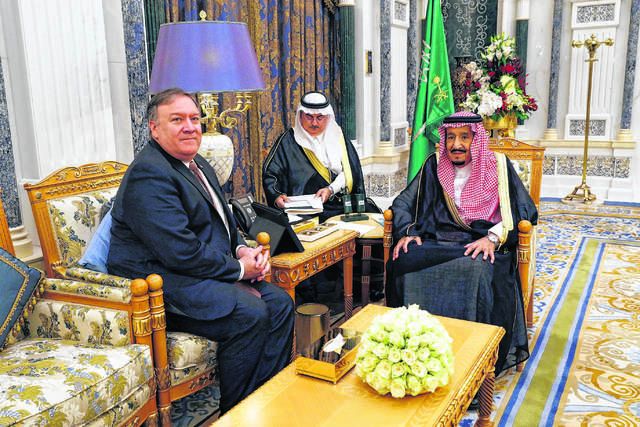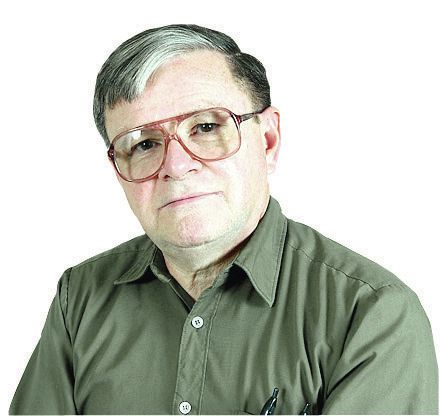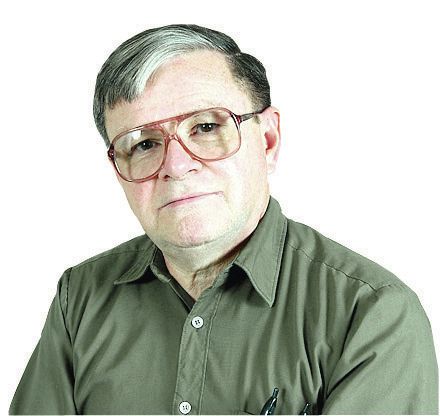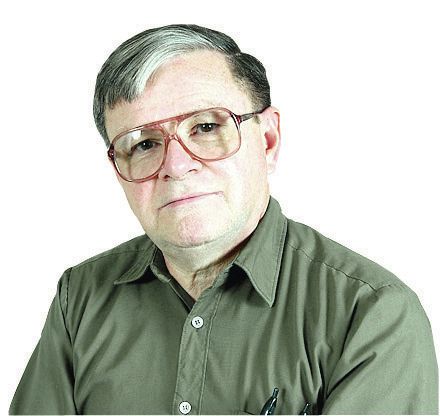Click here to subscribe today or Login.
Americans cast off one monarchy two centuries ago only to become curiously beholden to another.
Ever since FDR first met with King Abdul Aziz on the way home from the Yalta conference in 1945, the U.S. and Saudi Arabia have maintained a special relationship that dwarfs our longstanding love-hate saga with the British.
Oh sure, the U.S. and the U.K. have ties of kinship, language, democratic traditions and European security.
But the Saudis have lots of oil and a key strategic position in a part of the world where protecting our interests has not always been neat or easy, to put things nicely.
Despite some hiccups over time — like when 15 Saudi citizens were among the 19 9/11 hijackers — our friendship with the House of Saud has been a constant for more than 70 years now, through Republican and Democratic administrations.
Thus Donald Trump is only the latest American president to bow and scrape before our Saudi friends and help wipe away the blood when they have behaved badly, but he’s certainly done his best to play the role of obedient servant to the hilt.
First, you might recall, he did his best to protect American citizens and our Saudi friends by helpfully not including their country in the travel ban that excludes nationals of several predominantly Muslim nations from entering the U.S.
That policy was, of course, less comprehensive than what Trump said on the campaign trail back in 2015: “a total and complete shutdown of Muslims entering the United States until our country’s representatives can figure out what the Hell is going on. We have no choice.”
He even predicted: “It’s gonna get worse and worse. You’re gonna have more World Trade Centers.”
Must be that President Trump and our country’s representatives figured out what the Hell was going on with Saudi Arabia — a nation of about 33 million where non-Muslims are not even allowed to have Saudi citizenship and non-Muslim places of worship are formally prohibited.
They must have conclusively determined the oil-rich homeland of Osama bin Laden and 15 hijackers definitely doesn’t pose a risk of “more World Trade Centers,” so it’s only those other Muslims we have to keep out.
So Trump’s bizarre and contradictory reactions to the Saudi establishment’s suspected role in the death of Saudi journalist Jamal Khashoggi are neither new nor surprising.
Khashoggi, if you didn’t know, was an ardent critic of his nation’s brutal and heavy-handed regime who went missing on Oct. 2 after entering the Saudi consulate in Istanbul, Turkey.
Leaks from helpful Turkish officials with an axe to grind against Saudi Arabia suggest he was killed by a specially dispatched hit-squad. Whether those individuals were working directly for Saudi Crown Prince Mohammed bin Salman is not clear, but widely suspected.
In what appears to be a cynically clumsy cover-up, Saudi officials have gone from suggesting that Khashoggi died in a fistfight to stating Sunday that his slaying was a “tremendous mistake” by a rogue operation.
Trump, who last week was still saying the killing could have been the work of rogue killers, said Monday: “I am not satisfied with what I’ve heard. We’re going to get to the bottom of it.”
Maybe the same folks who helped Trump determine Saudi Arabia should be excluded from the Muslim travel ban can help him get to the bottom of this rogue fistfight gone wrong.
And what is he going to do about it?
In a 60 Minutes interview last week, the president vowed “severe punishment” if it emerged that the Saudi regime was behind Khashoggi’s killing, noting that the Saudis were then denying it.
But he also raised concerns about doing anything that would “hurt jobs” such as those at American companies supplying arms to our Saudi friends.
“I don’t want to lose an order like that,” Trump said. “And you know what, there are other ways of punishing.”
Given the history of U.S.-Saudi relations and Trump’s own admiration for the regime, the cynic in me believes any such punishment would be little more than symbolic, if anything at all is done.
In fairness to the president, there are legitimate fears not just about oil prices, but about upsetting the balance of power in a region where we have sworn enemies, such as Iran, and where increased Russian or Chinese influence would not serve our best interests one bit.
Trump does have some cards to play, however.
Candidate Trump also once said: “we don’t need the Saudis like we used to.” It’s true. The increase in domestic fuel sources thanks to fracking, as well as the fact that we import vastly more oil from other nations — Canada is our top supplier by far — both mean that Saudi Arabia’s crude is much less important to this country than in decades past.
They need us more than they — or we — acknowledge.
They also know the seeds of revolution have been planted in their growing young population, who are both more socially savvy and more concerned about a declining Saudi economy than their parents and grandparents.
The Saudi regime is so worried about dissent that it’s entirely believable that they would kill a crusading journalist and critic.
America used to be very good at telling oppressive kings where to get off.
We need to re-learn that skill.








